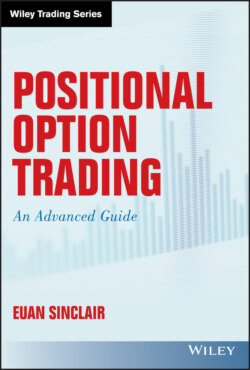Читать книгу Positional Option Trading - Euan Sinclair - Страница 21
Fundamental Analysis
ОглавлениеFundamental analysis aims to predict returns by looking at financial, economic, and political variables. For example, a fundamental stock analyst might look at earnings, yield, sales, and leverage. A global macro trader might consider GDP, currency levels, trade deficit, and political stability.
Fundamental analysis, particularly global macro, is particularly susceptible to subjectivity. It also tempts otherwise intelligent people to make investment decisions based on what they read in the Wall Street Journal or The Economist. It is exceedingly unlikely that someone can consistently profit from these public analyses, no matter how well the story is sourced or how smart the reader is.
Consider these statements from “experts”:
“Financial storm definitely passed.”
—Bernard Baruch, economic advisor to presidents Woodrow Wilson and Franklin Roosevelt in a cable to Winston Churchill, November 1929
Stocks dropped for the next 3 years, with the Dow losing 33% in 1930, 52% in 1931, and 23% in 1932.
“The message of October 1987 should not be taken lightly. The great bull market is over.”
—Robert Prechter, prominent Elliot wave theorist and pundit, in November 1987. The Dow rallied for 11 of the next 12 years, giving a return (excluding dividends) of over 490%.
“A bear market is likely… It could go down 30% or 40%.”
—Barton Biggs, chief strategist for Morgan Stanley, October 27, 1997
The Dow had its largest one-day gain on October 28 and continued to rally hard for the next 6 months.
In most situations it is just mean to make fun of people's mistakes. We all make mistakes. But the people I have quoted have proclaimed themselves experts in a field where real expertise is very, very rare.
And evidence of this is more than anecdotal.
The poor prediction skill of experts is a general phenomenon. Gray (2014) summarizes the results of many studies that show that simple, systematic models outperform experts in fields as diverse as military tactics, felon recidivism, and disease diagnosis. Expertise is needed to build the models, but experts should not make case-by-case decisions.
Koijen et al. (2015) show that surveys of economic experts (working for corporations, think tanks, chambers of commerce, and NGOs) have a negative correlation to future stock returns. They were also contraindicative for the returns of currencies and bonds. This effect applies across 13 equity markets, 19 currencies, and 10 fixed income markets. A simple “fade the experts” strategy would have given a Sharpe ratio of 0.78 from 1989 to 2012.
Financial advisors are equally bad. Jenkinson et al. (2015) look at the performance of advisors in picking mutual funds. They conclude with, “We find no evidence that these recommendations add value, suggesting that the search for winners, encouraged and guided by investment consultants, is fruitless.” And fund managers themselves can't consistently beat the averages. Due to costs, most managers underperform and there is no correlation between performances from one year to the next. So, managers can't pick stocks and it is pointless to try to pick good managers.
It is also likely that much of the alpha generated by fundamental analysis is smart beta, compensation for exposure to a certain risk factor. There is absolutely nothing wrong with this. Trading profits are profits, no matter whether they are due to smart beta or alpha. But before we ascribe a trader's results to skill, we should know what is causing the profits. Beta should cost a lot less than alpha.
